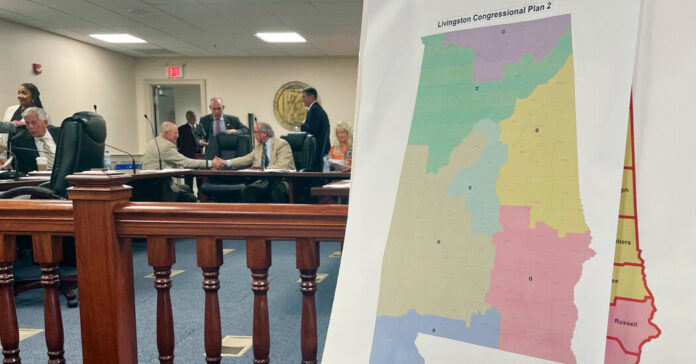The Supreme Court on Tuesday refused Alabama’s request to reinstate a congressional map drawn by Republican lawmakers that had only one majority-Black district, paving the way for a new map to be put in place before the 2024 election.
Alabama’s request to keep its map was the second time in under a year that it had asked the Supreme Court to affirm a limited role of race in establishing voting districts for federal elections in what amounted to a defiant repudiation of lower-court rulings. In the latest twist in the case, the lower court had found that the state had brazenly flouted its directive to create a second majority-Black district or something “close to it.”
The court’s order gave no reasons, which is often the case when the justices decide on emergency applications. There were no public dissents. The ruling clears the way for a special master and court-appointed cartographer to create a new map.
The special master in the case submitted three proposed maps on Monday, the deadline set by the three-judge federal district court. All three proposals included a second district where Black voters would have the opportunity to elect a candidate of their choice, according to a report filed by the special master.
The case could ultimately tip the balance of the House, where Republicans hold a thin majority. The trajectory of the case is also being closely watched by lawmakers in Washington and other states where similar battles are playing out.
In a surprise decision in June, the Supreme Court found that Alabama had hurt Black voters in drawing its voting map, reaffirming part of a landmark civil rights law.
Chief Justice John G. Roberts Jr., who has long been skeptical of race-conscious decision making, wrote the majority opinion. Justice Brett M. Kavanaugh joined him, along with the courts three liberal justices — Ketanji Brown Jackson, Sonia Sotomayor and Elena Kagan.
At issue was Alabama’s congressional map. Its Republican-controlled legislature sliced up the state into seven districts, continuing to maintain only one majority Black district, although about a quarter of state’s population is Black.
After the Supreme Court’s decision, state lawmakers scrambled to draw a new map. Over the objections of Democrats, the legislature pushed through a version that changed district boundaries but that did not include an additional majority-Black district. Instead, it increased the percentage of Black voters in one district to about 40 percent, from about 30 percent.
The federal three-judge panel overseeing the case found lawmakers had, yet again, likely violated the Voting Rights Act of 1965.
“The law requires the creation of an additional district that affords Black Alabamians, like everyone else, a fair and reasonable opportunity to elect candidates of their choice,” the panel wrote. The judges added that the Legislature’s proposal “plainly fails to do so.”
In asking the Supreme Court to intervene, Alabama’s attorney general, Steve Marshall, acknowledged that the Legislature had not added a second majority-Black district to its map as dictated by the federal court, but said its new map still complied with the law.
Unless the court acted, he wrote, “the state will have no meaningful opportunity to appeal before the 2023 plan is replaced by a court-drawn map that no state could constitutionally enact.”
In their brief, the plaintiffs, including a group of Black voters and advocacy organizations, urged the justices to reject Alabama’s request for relief and said the state had “unabashedly” sought to defy the courts using “recycled arguments.”
After the Supreme Court’s decision in June, the plaintiffs wrote, Alabama’s Legislature had drawn its plan in secret, with no opportunity for public comment, and had enacted it “over alternative plans that were supported by Black Alabamians.”
“Disagreement with this court’s ruling is not a valid reason to defy it — and certainly not a basis for a grant of an emergency stay application,” they wrote.



